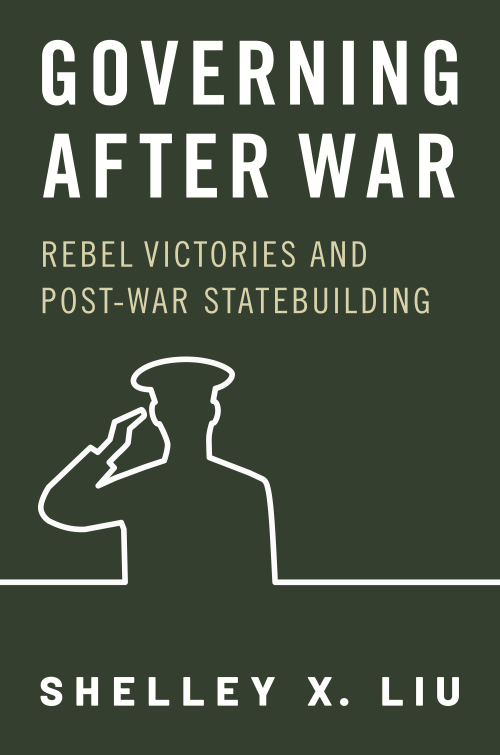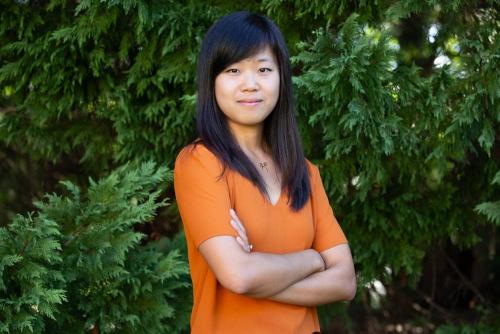
Political scientist Shelley Liu comes to the Sanford School from UC Berkeley’s Goldman School of Public Policy, where she was an assistant professor. At Sanford, she will teach the core class in Globalization and Governance at the master’s level, as well as courses in political violence, civil war, and the politics of development in the Global South.
“Sanford is very strong in international policy,” she says. “That is what attracted me to Duke, plus the chance to be back on the East Coast. I’m excited to meet students who are interested in international policy and development policy. Sanford has a diverse student body in terms of interest and diverse professors and scholars, and I’m looking forward to becoming integrated into that community. I want to bring additional perspective to the study of post-conflict development and authoritarian politics in the Global South.”

Her research
Liu’s research focuses on how conflict affects development, institutional weakness, and citizen trust in the state in polarized political contexts. From Sanford, she will continue examining the legacies of political violence, political polarization and misinformation, and statebuilding. Her first book, Governing After War: Rebel Victories and Post-war Statebuilding, is forthcoming at Oxford University Press.
“My main research agenda focuses on how the wartime processes and events shape the way governments act,” she says. “When war has ended, communities are fragmented, people are traumatized, and infrastructure must be rebuilt. Conflict termination does not necessarily mean a return to peace. The country is polarized, and many people may disagree with how peace processes are conducted or who has come into power. I’m interested in what governments’ priorities are then. What do they attempt to fix first? How do they seek to stabilize the country?”
Roots of her research
Liu’s interest in the political economy of conflict and development began with a book she read as an undergraduate at Columbia University, written by the renowned political scientist Robert Bates. “That book changed how I viewed the world, specifically the importance of thinking about how global affairs can have such profound and compounding effects on individual decision-making,” she says.
She had begun her undergraduate studies as a political science major with a focus on international relations. At the same time, she was also double majoring in violin through an exchange program with The Julliard School. But after reading Bates’ book and working as a research assistant on the topic of civil war and conflict, she decided to stop violin performance and pursue a Ph.D. in Government at Harvard.
There, she met Robert Bates, who had written the pivotal book. He was the Eaton Professor of the Science of Government at Harvard and became Liu’s advisor. (From 1985 until 1993, Bates was also the Luce Professor of Political Economy at Duke. Now Liu appreciates the chance to teach at the same institution.)
Time in Liberia

At the end of her second year as a doctoral student, Liu began fieldwork in Liberia. “It was an important trip,” she says. “You can read a lot about a place, but speaking to people firsthand, I learned a lot. People hold so many perspectives about the war, the combatants, and the warlords in charge.” A lot of these perspectives, she says, challenged the dominant narratives of the conflict.
“Many people had been dragged into the Liberian civil war, which killed more than 5 percent of the population. Everyday people fought because they were coerced or afraid. Some people told me they were 10 when they started fighting, and they did it because their parents said, ‘Go follow your big brother. It’s your only chance of surviving.’ The conflict is sensationalized in international discourse, but it is important to remember that individuals are pushed in various ways for survival.”
Seeing this up close motivated Liu to try to understand the relationship between citizens and the people who govern them. “During war, it may be warlords or rebel parties that try to govern. During peace, it’s governments. Why do some people resist and some give in? Why do people support different sides in a conflict, and how does that shape the political order during and after war?”
Liu’s research in Liberia led to her doctoral dissertation on Resistance and Control: Statebuilding through Rebel-Civilian Relations, which won the Senator Charles Sumner Dissertation Prize at Harvard. But today, the questions remain endlessly fascinating to her and will continue to drive her scholarship at the Sanford School.
During war, it may be warlords or rebel parties that try to govern. During peace, it’s governments. Why do some people resist and some give in? Why do people support different sides in a conflict, and how does that shape the political order during and after war?
Shelley Liu
